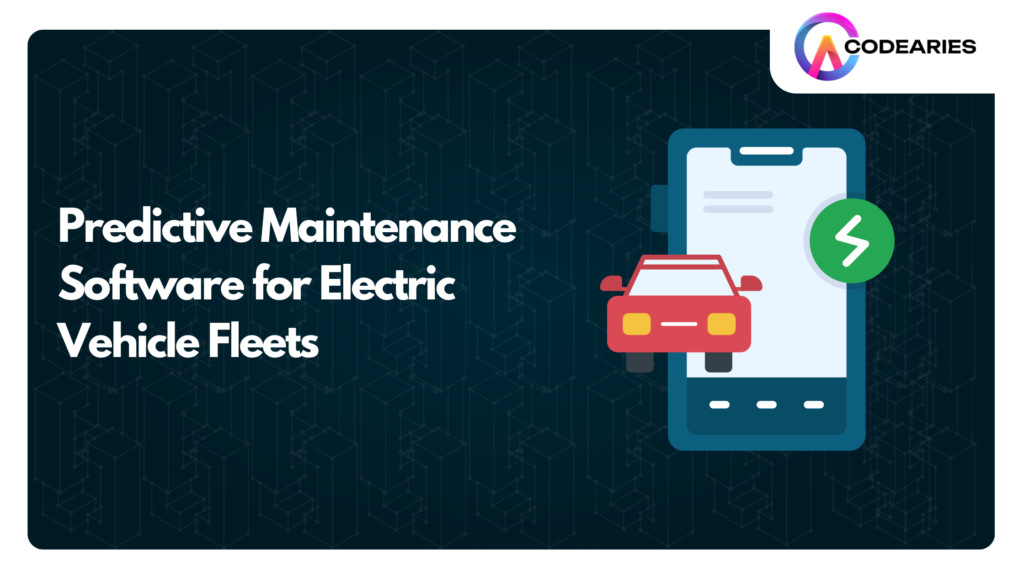Electric vehicles (EVs) are transforming transportation, offering a greener, more sustainable alternative to traditional fuel-based fleets. As more fleet managers shift toward EVs, they encounter a new set of challenges, particularly in maintaining and managing their vehicles effectively. Predictive maintenance software for electric vehicle fleets is emerging as a solution that addresses these concerns by leveraging advanced data analytics to foresee potential issues and schedule maintenance before failures occur. This innovation is helping fleets reduce downtime, extend vehicle lifespans, and minimize operational costs.
In this article, we will explore how predictive maintenance software can revolutionize the management of electric vehicle fleets. From reducing costs to ensuring higher vehicle reliability, this technology is quickly becoming essential for fleet operators.
Understanding Predictive Maintenance Software for Electric Vehicle Fleets
Predictive maintenance software employs data, machine learning (ML), and artificial intelligence (AI) to forecast potential failures in vehicle components. For electric vehicles, where factors like battery health and charging infrastructure are critical, this software continuously monitors performance through various sensors. By identifying issues early, fleet managers can mitigate unexpected breakdowns and optimize vehicle availability, ultimately avoiding costly repairs.
Did you know?
The Importance of Predictive Maintenance for EV Fleets
Electric vehicles have unique maintenance needs compared to traditional combustion engine vehicles. Core components like batteries require specialized attention, and unplanned downtime can lead to expensive repairs and delays. Predictive maintenance software equips fleet operators with the foresight needed to keep vehicles in optimal condition, reducing the risk of sudden failures and enhancing overall efficiency.
The Data-Driven Approach to Maintenance
Data is the foundation of predictive maintenance. EVs are fitted with numerous sensors and IoT devices that continuously collect information about various systems, including battery temperature and overall performance. This data is analyzed by predictive maintenance software using machine learning algorithms to identify anomalies that may signal potential failures. Armed with this knowledge, fleet managers can schedule maintenance activities strategically, minimizing disruption to operations.
Key Benefits of Predictive Maintenance Software
The advantages of using predictive maintenance software for electric vehicle fleets include:
- Reduced Downtime: Early issue detection minimizes time spent in repairs, ensuring higher fleet availability.
- Cost Savings: Preventing major breakdowns reduces repair costs and prolongs the lifespan of critical components, especially expensive batteries.
- Improved Efficiency: Optimized maintenance scheduling allows fleet managers to align maintenance with operational demands.
- Enhanced Safety: Continuous monitoring ensures that vehicles are safe to operate, reducing the risk of accidents due to component failures.
- Better Resource Management: Enables more effective allocation of resources like labor and parts for maintenance activities.
How Predictive Maintenance Software Functions
The operation of predictive maintenance software involves several key steps:
- Data Collection: Sensors in EVs gather information on essential components such as battery performance and motor health.
- Data Processing: This data is sent in real-time to the software, where it is analyzed using AI algorithms.
- Analysis: Machine learning identifies patterns and predicts when a component might fail based on historical and current data.
- Alerts and Scheduling: When potential failures are detected, fleet managers receive alerts, enabling proactive maintenance before breakdowns occur.
Addressing EV-Specific Fleet Management Challenges
Managing an electric vehicle fleet presents distinct challenges, including:
- Battery Health: Monitoring battery performance and ensuring proper charging practices to maximize lifespan.
- Charging Infrastructure: Ensuring adequate charging stations are available and that vehicles can complete their routes without running low on battery.
- Software Integration: Merging predictive maintenance tools with existing fleet management systems for seamless data flow.
Predictive maintenance software addresses these challenges by providing real-time insights into vehicle conditions, helping fleet managers ensure their EVs are always ready for use.
Financial Advantages of Predictive Maintenance
One of the most significant benefits of predictive maintenance software is its ability to deliver measurable financial outcomes. By preventing unexpected breakdowns, fleet managers can avoid costly repairs and minimize the need for spare vehicles. Additionally, this software helps extend the lifespan of expensive EV components, particularly batteries, reducing overall replacement costs.
Moreover, predictive maintenance allows for more accurate budgeting and resource allocation, enabling fleet managers to forecast maintenance expenses and control operational costs effectively.
Reducing Operational Costs for Fleet Managers
Cost management is a priority for fleet operators. Predictive maintenance software helps lower operational costs by:
- Optimizing Maintenance Intervals: Eliminating guesswork in scheduling repairs reduces unnecessary or premature maintenance.
- Preventing Expensive Breakdowns: Early detection avoids costly emergency repairs and service disruptions.
- Maximizing Vehicle Lifespan: Keeping vehicles in optimal condition prevents premature replacements.
By enabling data-driven decision-making, predictive maintenance enhances financial performance while ensuring that EV fleets remain operational.
The Role of AI in Maintenance Optimization
AI plays a critical role in enhancing predictive maintenance, particularly for electric vehicle fleets. Through complex algorithms, AI analyzes extensive sensor data to uncover patterns that might not be readily apparent. This capability allows the software to create highly accurate maintenance schedules tailored to each vehicle’s unique operating conditions.
As AI technology advances, these systems will become even more efficient, reducing the need for manual oversight and improving maintenance prediction accuracy.
Future Trends in Predictive Maintenance for Electric Vehicles
Predictive maintenance is essential for electric vehicles (EVs) to ensure optimal performance and longevity. As EV technology advances, several key trends are emerging:
Advanced Sensor Technology
- IoT Integration: Embedded sensors will provide real-time data on battery health, motor performance, and tire condition.
- Improved Accuracy: Sensors will become more precise, detecting subtle anomalies that indicate potential issues.
AI and Machine Learning
- Predictive Algorithms: AI will analyze extensive datasets to forecast failures, enabling proactive maintenance.
- Anomaly Detection: These technologies will identify unusual patterns, alerting operators to emerging problems.
Digital Twins
- Virtual Models: Digital twins will simulate EV performance, allowing for better maintenance scenario analysis.
- Predictive Insights: Data from these models will refine maintenance schedules and predict component lifespans.
Blockchain Technology
- Data Integrity: Blockchain will secure maintenance records, ensuring transparency and preventing tampering.
- Traceability: It will track each vehicle’s maintenance history, aiding future predictions.
Remote Diagnostics and Over-the-Air Updates
- Continuous Monitoring: Remote diagnostics will facilitate real-time health assessments of vehicles.
- Seamless Updates: Over-the-air software updates will keep EV systems current without service visits.
Smart Charging Integration
- Intelligent Solutions: Predictive maintenance will optimize charging schedules for better battery health.
- Adaptive Management: Charging stations will adjust rates based on battery data, minimizing stress.
Personalized Maintenance Plans
- Behavioral Insights: Maintenance schedules will be tailored to individual driving habits.
- Model-Specific Needs: Plans will account for the specific requirements of different EV models.
These trends will enhance the reliability, efficiency, and safety of electric vehicles, improving the overall ownership experience through advanced technologies and data analytics.
Conclusion
Predictive maintenance software represents a significant advancement for managing electric vehicle fleets. By leveraging data and AI, fleet managers can anticipate maintenance needs, reduce downtime, and optimize operational costs. As the adoption of EVs continues to grow, embracing predictive maintenance will be essential for ensuring the long-term success and efficiency of electric vehicle operations.
FAQs
What is an EV Fleet Management System?
An Electric Vehicle (EV) Fleet Management System is a specialized software solution designed to optimize the operation and maintenance of fleets of electric vehicles. This system helps fleet operators track vehicle performance, monitor charging stations, manage energy consumption, and ensure compliance with regulations. It often includes features like route optimization, real-time tracking, maintenance scheduling, and reporting tools, allowing operators to enhance efficiency, reduce costs, and minimize downtime.
What is Predictive Maintenance of Vehicles AI?
Predictive maintenance in vehicles utilizes artificial intelligence (AI) and machine learning algorithms to anticipate potential failures or maintenance needs before they occur. By analyzing data from various sensors and historical maintenance records, the system can identify patterns and predict when a vehicle is likely to require servicing. This proactive approach helps reduce unexpected breakdowns, extend the lifespan of vehicles, and optimize maintenance schedules, ultimately saving costs and improving fleet reliability.
Who are EV Fleet Operators?
EV fleet operators are organizations or individuals that manage a fleet of electric vehicles for various purposes, such as transportation, delivery services, or public transit. These operators can include businesses, government agencies, logistics companies, and ride-sharing services. Their primary goal is to efficiently utilize their electric vehicles while minimizing costs and maximizing operational effectiveness. Effective fleet management is crucial for ensuring sustainability and meeting growing environmental standards.
Which Technology is Used in Predictive Maintenance?
Predictive maintenance employs various technologies, including:
- IoT Sensors: These devices collect real-time data on vehicle performance and health.
- Data Analytics: Advanced analytics processes the data to identify trends and patterns.
- Machine Learning: Algorithms learn from historical data to improve prediction accuracy over time.
- Cloud Computing: Enables data storage and processing at scale, facilitating remote monitoring and access to insights.
- Digital Twin Technology: Creates a virtual model of the vehicle for detailed analysis and simulation.
Together, these technologies enable a more efficient and reliable approach to vehicle maintenance.







